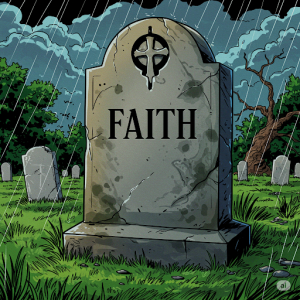
According to the NIV, James 2:26 states, “As the body without the spirit is dead, so faith without deeds is dead.” This verse is frequently cited to support the claim that faith alone is insufficient for salvation. It is used to argue that “works,” whatever that really entails, are necessary for faith to be genuine. If faith is not genuine, then the person does not meet the requirement for salvation as they do not have “saving faith.” But does this accurately reflect the author’s intended message?
I’ll be honest; I was confused by this verse for a considerable time. I found myself shifting between different interpretations, influenced by the varying doctrines of those around me. Did it really imply that we had to engage in certain actions to achieve salvation? If that’s the case, what exactly must we do? But, wait. Doesn’t the Bible say that we’re saved by grace, not by our works? Which teaching holds true?
If you’ve felt stressed about this passage being used to argue that you’re not a child of God, first find comfort in knowing that this verse does not pertain to eternal salvation. Although our trust in God and in his teachings should eventually be reflected in our actions, our eternal destiny is not determined by our deeds. The reason is that God is, well—God. He doesn’t require evidence of our “works” to recognize us as his, as he perceives the heart (1 Sam. 16:7; 1 Kgs. 8:39) and is the one who grants us justification.
Others don’t need to witness our deeds to verify our spiritual status, as they lack the power to save us, meaning our eternal fate is not in their hands. When will we realize that mere mortals cannot judge another’s eternal destiny or relationship with God? What kind of ignorance does this arise from? What sort of pride and arrogance perpetuates this belief through the ages?
Nevertheless, our actions do hold significance. For one, our good deeds are intended for others to see—not so they can commend us or label us as “good people,” which is often the motivation behind many good actions. Nor is it done for others to analyze and judge whether we are “saved.” Instead, it’s so they can observe how we honor the Lord’s teachings so they might glorify our Father in heaven (Matt. 5:16).
So, what could “Faith without works is dead” be referring to? Let’s analyze it further. If you’re a fan of crime dramas like Law and Order, you understand that missing the opening moments of an episode can leave you lost for the rest of the show, as the context is crucial. You’ll have no idea what’s going on.
I tend to approach Scripture in the same manner, particularly with verses that seem unclear. Thus, in this post, we will start from the beginning, covering the foundational elements before closely examining the surrounding passages, to clarify the meaning of our key verse.
A Few Notes About James’ Epistle
The letter commonly known as “James,” which is actually the name “Jacob,” but somehow made it into English Bibles as “James,” is believed to have been authored by the half-brother of Jesus, who served as a leader in the Jerusalem church.
This epistle, traditionally believed to have been written somewhere between the 40s and 60s A.D, was directed “to the twelve tribes scattered among the nations” (v. 1), addressing brothers and sisters (vv. 2, 16, 19) and fellow believers (v. 5, 27). The ultimate goal of the letter was to instruct, encourage and to correct with the Word of God.
There are five biblical chapters in the epistle, and upon attentive reading of each chapter, regardless of whether one understands every detail, it becomes clear that there is a main theme. The focus is on navigating temptations in a variety of situations while acting justly and using one’s words appropriately. Our next step is to examine the passages leading up to our target verse.
Chapter 1: 2-21
Temptation and Perseverance
At the beginning of the letter, the author states:
Consider it pure joy, my brothers and sisters, whenever you face trials of many kinds,
— James 1:2 NIV
The term translated as “trials” and sometimes as “testing” actually signifies “temptation.” To be tempted is to be urged, persuaded, or lured into doing something that is wrong or immoral, usually for personal gain or other unethical reasons. It represents a strong desire to act. This can also imply testing someone’s ability to resist such temptations. Regardless of one’s identity, everyone will inevitably face a multitude of temptations in this life.
These believers were encouraged to consider these temptations with gladness, knowing that their testing of the faith would develop perseverance (v. 3). The most logical interpretation of verse 4, is that they were to let perseverance “keep,” “cling,” or “hold fast” (ἔχω), through to the finished work, in order that they all might be complete and whole, lacking in nothing (v. 4). To clarify, through testing, the will and strength to adhere to the truth is developed. This perseverance should mature throughout the journey, and should remain until the final result is achieved, ensuring the church of God emerges blameless.
The next few verses focus on wisdom, encouraging those who feel they lack it to ask for it. This suggests that possessing and applying wisdom is crucial to the author’s message (vv. 5-8). Following that, he again speaks of perseverance during trials, using a metaphor to portray those who fail to persevere, namely, the “rich” (vv. 9-11). But blessed are those who persevere under trial because having stood firm through the test, they will receive the crown of life which the Lord promised to those who love him (v. 12). The prize goes not to those who start the race, but to those who finish it.
Next, he explains that temptation does not originate from God but arises when one is lured by their own desires. Once these desires take root, they lead to sin, or “error” and that error, being fully developed, or “complete,” results in death (vv. 13-15). Therefore, he warns against being misled, as every good and complete gift, perfect in all points, comes from the Father above, who desired to bring them forth through the word of truth, establishing them as one of his beginning foundations (κτισματων) (vv. 16-18).
I believe the Greek word, ktisma (κτισματων), here, relates to settlements or forms of colonies built on the principles of God. This seems to be the most common translation, while “creatures” appears to be unique to the New Testament. It was from the early diaspora, and believers in Jerusalem, that the first of many believing communities would emerge worldwide.
Consequently, they needed to create these communities grounded in their beliefs with the Word of God serving as their foundation. Thus, the first churches of God in Christ were born, and like anything new, they had to learn. This understanding can help put this letter into better perspective.
Don’t Judge On Human Instinct
Next, the letter reveals a main theme that will continue through the next few passages: judging. However, this isn’t the type of judgment we often think of when someone critiques our lifestyle or personal decisions, prompting us to respond with phrases like “You’re just judging” or “Stop judging.” This likely refers to judgments made in a formal court setting or civil disputes.
The author stresses the importance of being prepared to listen and understand while also being slow to speak and slow to follow natural impulse (οργην). This implies that one should consider the entirety of a matter and the Word of God before speaking or acting, in order to avoid making foolish, impulsive, or ungodly decisions driven by emotions (v. 19).
This could also include accepting a bribe to wrongfully condemn the innocent, in pursuit of one’s own desires. The natural impulse (οργην) of a person, does not result in the uprightness or morality of God (v. 20).
Therefore, they were encouraged to rid themselves of the unethical and immoral behaviors that were rampant among them and to instead, adopt the doctrine that had been planted within them—something new and transformative that could preserve their lives (v. 21), presumably, from the death that was mentioned earlier.
The finished work that comes from obeying the Word and results in life, contrasts with the finished work that comes from following human inclination and results in death. Thus, by obeying the Word, one is rescued from the death that comes from naturally obeying the flesh.
So, to summarize, there are two distinct paths being considered. The first path is driven by one’s own natural desires or passions. Acting upon this desire leads to a complete or “perfect” work known as sin, which results in death and is therefore considered worthless. The second route is to be guided by the Word of God. Acting in accordance with this word, also produces a complete work, but one that is good and beneficial. This outcome, unlike sin, leads to life.
In essence, impulsive desire plus action equals error, which leads to death, while the Word of God combined with action yields blamelessness, leading to life. Although we could explore this topic further, unfortunately, time does not permit.
Chapter 1:22-27
Don’t Merely Listen to the Word
Now, let’s move closer to our key verse, “faith without works is dead.” To grasp the meaning of this verse, we must first consider the context provided by the surrounding text. In the NIV, Chapter 1, verses 22-27 read as follows:
22 Do not merely listen to the word, and so deceive yourselves. Do what it says. 23 Anyone who listens to the word but does not do what it says is like someone who looks at his face in a mirror 24 and, after looking at himself, goes away and immediately forgets what he looks like. 25 But whoever looks intently into the perfect law that gives freedom, and continues in it—not forgetting what they have heard, but doing it—they will be blessed in what they do.
26 Those who consider themselves religious and yet do not keep a tight rein on their tongues deceive themselves, and their religion is worthless. 27 Religion that God our Father accepts as pure and faultless is this: to look after orphans and widows in their distress and to keep oneself from being polluted by the world.
Essentially, the message seems to be that they should not just be disciples who listen to their master’s teachings and share them with others or show up to the meeting just to hear the reading of Scripture, but they should actively practice what they hear and learn. Not doing so would mean deceiving oneself, claiming to believe something while their actions suggest otherwise.
Beware of Self-Deception
Jesus taught his followers that a good person proclaims good things from the good treasure of their mind, and an evil person proclaims evil things from what is stored up in their mind. This is because one speaks their words from the overflow of his or mind (Lk. 6:45). That is to say, they will proclaim whatever teachings, information, thoughts, or desires they have filled their mind with.
If, however, someone’s actions don’t coincide with what they proclaim, their mind is being tricked, cheated, or deceived since they mislead their mind into thinking something about themselves that is not true: that they trust and adhere to a thing when they don’t. A person may feel uneasiness and discomfort as a result of this.
Therefore, to soothe their conscience and justify their sinful actions, the person may begin to minimize the importance of God’s teachings or pick and choose which ones to follow. Over time, they may come to believe that they adhere to the Word, even as their actions remain corrupt and irreverent towards God (vv. 22-24).
This may be the type of self-deceived individual Jesus said would come to him, saying, “Lord, Lord, did we not prophesy in your name and in your name drive out demons and in your name perform many miracles?” (Matt 7:22 NIV) But Jesus will say to them, ‘I never knew you. Away from me, you evildoers!’ (Matt. 7:23)
The mere act of hearing without acting upon it, or more specifically, while doing the exact opposite of what you hear, still results in error that yields unfavorable results (Lk. 6:49). However, those who actively listen to the law that grants freedom and put it into practice will be blessed (vv. 25) (Lk. 6:46-48).
The Law of Freedom
Based on the context surrounding it in this letter and other parts of Scripture, the whole or complete law of freedom mentioned here probably relates to loving one’s neighbor. This law could be considered a “rule” or “principle.” Thus, the principle of freedom is this: The fact that we are free from the restraints of sin should lead us to fulfilling the “royal ordinance” of love, thus, loving our neighbor as ourselves.
13 You, my brothers and sisters, were called to be free. But do not use your freedom to indulge the flesh; rather, serve one another humbly in love. 14 For the entire law is fulfilled in keeping this one command: “Love your neighbor as yourself.” 15 If you bite and devour each other, watch out or you will be destroyed by each other. — Gal. 5:13- 15
36 “Teacher, which is the greatest commandment in the Law?” 37 Jesus replied: “‘Love the Lord your God with all your heart and with all your soul and with all your mind.’ 38 This is the first and greatest commandment. 39 And the second is like it: ‘Love your neighbor as yourself.’ 40 All the Law and the Prophets hang on these two commandments. — Matt. 22:36-40
”I will walk about in freedom, for I have sought out your precepts. — Ps. 119:45
Controlling the Tongue
Verses 26 appears to reinforce earlier points about the importance of controlling one’s tongue by not speaking or making decisions impulsively. Verse 27 emphasizes the responsibility—likely aimed at those in positions of authority—to care for the vulnerable, shielding them from the immorality and biases present in the wicked world. Thus, my understanding of verses 26-27 is as follows:
If anyone among you thinks to be pious, not controlling his words, instead deceives his mind. This religion is profane. Religious service, unmixed and pure in the presence of the God and Father is this: to see about orphans and widows in their affliction, (being) faultless oneself to protect (others) from the (evil and corrupt) world-order/governing authorities/society.
Now, let’s move on to chapter two.
Chapter 2:1-11
Favoritism
Transitioning to chapter two, verses 1-11 address the issue of favoritism in judgment. The context suggests that some were favoring individuals of higher social and financial status while dishonoring the poor, reminiscent of our society today (vv. 1-7). Showing favoritism in either direction contradicts God’s commandments, resulting in sin and labeling one as a lawbreaker (v. 8).
16 At that time I commissioned your judges, ‘Hear the cases that arise between your brothers; and judge fairly between a man and his brother, and the foreigner who is with him. 17 You are not to show favoritism when judging, but give equal attention to the small and to the great. No matter how a person presents himself, don’t be afraid of him; because the decision is God’s. The case that is too hard for you, bring to me and I will hear it.’ — Deut. 1:16-17 CJB
18 “You are to appoint judges and officers for all your gates [in the cities] Adonai your God is giving you, tribe by tribe; and they are to judge the people with righteous judgment. 19 You are not to distort justice or show favoritism, and you are not to accept a bribe, for a gift blinds the eyes of the wise and twists the words of even the upright. 20 Justice, only justice, you must pursue; so that you will live and inherit the land Adonai your God is giving you. —-Deut. 16:18-20 CJB
15 “‘Do not be unjust in judging — show neither partiality to the poor nor deference to the mighty, but with justice judge your neighbor. —Lev. 19:15 CJB
This behavior also means not fulfilling the command to “Love your neighbor as yourself” (v. 9), which, along with the command to love God with all your being and resources, summarizes the entirety of the Torah.
Slander, Condemnation, and Murder
The subsequent verses are somewhat unclear. It’s conceivable that the wealthy were unjustly condemning and killing individuals (James 4:2; 4:11; 5:6) perhaps through bribery, slander, or their social status, causing the poor to face severe penalties, such as death for crimes like adultery, as prescribed in the Torah (Deut. 22:22).
They may have committed these acts in order to achieve their desires (James 4:1-3), in accordance with James 1:13-15. This may be why the author felt the need to caution the believers not to be fooled or led away, informing them that everything good and perfect comes from God (James 1: 16-17) and not the sinful methods some were using.
A notable example of this is Jezebel, who orchestrated the slander and murder of Naboth, so that Ahab could acquire his vineyard for a vegetable garden (1 Kgs. 21). This behavior might closely resemble the circumstances surrounding this letter, and such actions constitute murder. Consequently, the author indicates that anyone who breaks any part of the law is guilty of transgression, regardless of their identity, suggesting that everyone should be judged equally.
If one person is executed for adultery, then another should also be executed for murder. However, in the letter, the author specifically addresses the wealthy for their wicked practices, implying that they likely evaded punishment due to someone overlooking their misdeeds, not upholding the Lord’s word impartially. The one showing favoritism, would also be just as guilty of murder as the one who slandered or offered a bribe. Yet, only the “poor,” those who couldn’t pay for someone to look the other way, would be condemned.
I’m sure there are better interpretations, but ultimately, the main takeaway from this section is the importance of rendering fair judgments without favoritism. Next, we will examine verses twelve and thirteen.
Mercy Triumphs Over Judgement?
The author, in verse 12, urges his audience:
In this way, you all speak and so do: like by (the) law of freedom, you (all) are going to be judged.
To put it another way, don’t just talk about it; be about it. Speak and also act, as if you are going to be judged by the law of freedom, which again, goes back to the concept of loving your neighbor as you love yourself. What treatment would you want in the same circumstance? It’s natural to want to be judged fairly and compassionately. Have you shown the same compassion and fairness to your brother or sister? Christ taught that one should do to others as they would have done to themselves (Lk. 6:31). They should essentially, as we say, “Put themselves in the other person’s shoes” so as to judge in accordance with the law of freedom.
Now, let’s look at verse thirteen. I believe the key to understanding James 2:17 and 2:26, lies in James 2:13, which is typically translated as “…Mercy triumphs over judgment.” But what do we mean by mercy and judgment? Mercy refers to compassion or pity, while judgment denotes the act of distinguishing or separating, which involves making choices or decisions. In our society, the term “judgment” often carries a negative connotation, but it simply signifies a decision. As an example of this misconception, gotquestions.com says:
“The idea is that mercy “glories” or “boasts” against judgment, knowing that where mercy and judgment seem to conflict, mercy wins.”
This traditional interpretation suggests a scenario where compassion prevails over a decision. If this seems nonsensical, you’re not alone; these concepts are not contradictory nor are they in opposition. Additionally, if mercy is said to “triumph” over judgment, whatever that implies, then what was the purpose of the warning that those who lack mercy will not be shown mercy, if their punishment will simply be overridden by mercy who somehow emerges victorious over judgment, aka “punishment?”
Mercy and judgment can coexist, and mercy can only be expressed in the context of judgment. In other words, there can be no mercy without judgment. Thus, the traditional translation may not accurately reflect the intended meaning. However, judgments can indeed be made with mercy, which seems to be the core message of this verse, highlighting the main focus of the passage. The full verse of James 2:13 in the NIV reads:
because judgment without mercy will be shown to anyone who has not been merciful. Mercy triumphs over judgment. — James 2:13
In the Greek text, the verse reads:
η γαρ κρισις ανιλεως τω μη ποιησαντι ελεος και κατακαυχαται ελεος κρισεως
Thus, my understanding is as follows:
because judgement without mercy is for the one who has not performed mercy and/but boasts concerning (κατα | καυχαται) mercy (acc.) with judgement.
The word kaucháomai (καυχαται) means to “boasts” or to “speak loud.” One translation of the word is to “vaunt” which Per Merriam Webster means:
intransitive verb
“to make a vain display of one’s own worth or attainments : BRAG
transitive verb
: to call attention to pridefully and often boastfully
This would refer to one making a vain display of the importance of adherence to God’s teachings, without actually following them. It could occur in the context of a teaching setting, or possibly within rhetorical speech, a method of persuasion commonly used at that time.
Regardless of the exact setting, the point is that simply saying what one believes isn’t enough in this type of situation. You can’t love your neighbor merely with lip service. So again, don’t just hear the teaching and say you believe it, act on it; and do so rightly. Because judgement without mercy will be given to the one who judges others without mercy but then turns around and speaks like that’s what they practice when they don’t.
They claim it’s what they believe and may go around teaching or promoting it, but they don’t practice what they preach. Basically, they’re hypocrites. They wear a mask of righteousness but behind the mask is a person with a prideful arrogant heart who masquerades and puts on a show for others.
In making whatever type of judgements or decisions the author is referring to, those who judge rashly or with favoritism, both which are absent of mercy, will not be shown mercy when they themselves are judged, especially for doing the same things (Romans 2:1). But blessed are the merciful since they will be shown mercy (Matt. 5:7).
“Be merciful, just as your Father is merciful” (Lk. 6:36 NIV)
Understanding “Faith Without Works Is Dead”
Thus far, it is clear that the author is focused on the subject of judging. The reader has been cautioned not to make hasty decisions based on emotions, to avoid favoritism in their assessments, and to practice mercy in their judgments. Additionally, they are reminded not to boast of beliefs they do not practice, as such talk ultimately serves no purpose; they need to actually do what it is they speak of.
This context sets the stage for our star passage and verse. With our refined understanding of verse 13, the text now transitions more smoothly, rather than seeming to shift abruptly between unrelated topics. I propose that James 2:12-26 could be expressed in the following manner:
Speak and so do, as though you are going to be judged by the law of freedom. Because judgement without mercy is for the one who has not shown mercy but boasts about mercy with judgement. What is the advantage my brothers, if a belief anyone says to have but deeds it does not have? Can the belief preserve him?
And, if a brother or a sister is laying bare and they are lacking daily nourishment and has said anyone to them from of you, “Go forward in peace. Warm yourselves and feed yourselves” but not you have given them the necessities of the body, what is the benefit? In the same way also, the belief, if not deeds it has, dead it is, unable to be satisfied by itself.
Still, someone will say, “You, a belief you have and I, deeds I have.” Reveal to me what you believe with your deeds, and I will reveal to you with my deeds, what I believe. You—you believe that God is one, rightly. You make also the divinities comply and shudder. But you lack to have understood “O’ Empty Man,” that the belief separate of the deeds, dead it is.
Was it not from deeds that Abraham was pronounced as right (through) an offering—Isaac, his son—upon the altar? You see how the belief was working together with his actions and from the actions, the belief was made perfect/complete?
And so, the writing was fulfilled, the one that says, “and Abraham trusted in God, and it was credited to him for righteousness and a friend of God he was called.” You all see, therefore, that from deeds a person is considered right and not from a belief only.
And in like manner, also Rahab, the prostitute—was it not from deeds that she was deemed right, having welcomed those messengers and on a different road sent (them) out? For, just as the body without breath, dead it is, in the same way also, the belief without the deeds, dead it is.
“Dead,” in this context, means useless or unproductive. Essentially, the author is expanding on the idea that boasting about judgment with mercy, without actually practicing it, is pointless. Talking won’t make anyone righteous, and it won’t save anyone from anything.
As such, he shares guidelines on how they ought to behave when it comes to judging others in their communities. They should speak, and after the same manner act, as if they were to be judged by the principle of freedom. Thus, it was imperative that they show mercy to others, reflecting the mercy God had granted to them; simply talking about it was insufficient.
This was the purpose of the statement, “faith without works is dead.” The Greek word often translated as “faith,” can have a variety of meanings, such as “belief,” “assurance,” “conviction,” “trust,” or even “proof, argument, or reasoning” in rhetorical contexts. “Belief,” however, seems to be a common element among them all, and seems most appropriate in this context.
Basically, the idea is that holding onto a belief that does not lead to deeds is worthless. Without deeds, one cannot be considered righteous, nor can they be rescued on the day of judgment, which may pertain to eternal judgment or another form of judgment. The author does not specify, and it is best not to make assumptions.
A fitting example is the Parable of the Unmerciful Servant found in Matthew 18:21-35. After receiving mercy from his master and being released, if the servant had gone about proclaiming the king’s mercy and promoting the importance of being merciful to others, do you think the king would have let him off the hook instead of sending him to prison? Could that belief have saved him from such a fate? I highly doubt it, and I think this is the reasoning “James” had in mind when he posed the rhetorical question: “Can the belief save him?”
The fact is, talk is cheap. A mere conviction will not fulfill the Lord’s teachings, any more than telling someone in need to be warm and full will make them feel warm and full without giving them food and clothing. As such, a belief by itself remains incomplete; it’s as one side of a conversation, a lonely half of a whole, without corresponding actions to bring it to completion.
However, contrary to what many believe and teach from this passage, it is entirely possible to have faith or belief without accompanying actions. “Dead” faith does not equate to false faith. Additionally, since I’m on the topic, there is no concept of “false faith” or “true faith” in the Bible; such distinctions are nonexistent. I’m not “judging” anyone, as I once promoted the same misconceptions. But the reality is that faith is simply faith, and one either has it, or they don’t. However, without actions, what is the purpose of it?
Consider plants as an illustration. In many cases, without seeing the part of the plant that grows above the soil, you would never realize a seed ever existed. Though the seed is very much present, it is hidden underground, and we cannot utilize it directly. However, as the plant begins to develop roots, grow, and mature, the evidence of the seed’s existence becomes apparent through flowers, leaves, and fruit. Once fully grown, the plant offers numerous benefits to both humans and animals. If it were to stay merely a seed, what purpose would it serve? What would be its profit?
In terms of faith, the seed represents the belief or the “word planted in you” (James 1:21). This belief or conviction is concealed within our hearts, invisible to the human eye. Our actions stemming from this belief yield a finished product—a complete or perfect work: righteousness. The resulting fruit from our deeds serves as evidence of the belief residing within us and can benefit not only ourselves but also those around us.
Thus, although presented within a specific context, the author conveys a fundamental message: do not merely hear, learn, and proclaim God’s teachings, but actively implement them. If beliefs are not backed up by actions, they are nothing more than empty words, unhelpful to anyone. Therefore, they cannot declare one righteous, or to be “doing what is right” in accordance with the Word. Though there is much more to be understood from this passage, the essential message is this: Blessed are those who do the Word, rather than hear it only (Lk. 11:28).
Conclusion
The phrase “Faith without works is dead,” found in the letter of James, does not pertain to eternal salvation. Instead, the author emphasizes to the twelve tribes of Israel, dispersed among the nations, the importance of hearing and implementing the teachings of God, particularly in the context of the command to love one’s neighbor as oneself.
The entire passage focuses on the proper way to judge others within their communities, without conforming to the surrounding culture. It warns against favoritism in judgment, highlighting the fact that all who sin are lawbreakers, and teaches that making decisions based on natural impulses or desires—like anger, slander, or accepting bribes to wrongfully accuse and kill the innocent—results in sin and does not fulfill God’s command to love others.
Furthermore, it notes that confidently proclaiming beliefs while one’s actions contradict those principles, is unproductive. Whether it involves advocating for a belief without corresponding deeds, which can lead to self-deception or misleading others, or having faith in God without demonstrating it through good work for others to see and glorify him, the overarching truth is that holding onto a doctrine, or belief without corresponding actions is worthless, and it cannot fulfill the law of God.
That being said, initial faith in God, which fundamentally means trust in him, marks the point of our justification (Ex. 19:1-11; Eph. 1:13; Jn. 6:28-29). However, our new faith should be accompanied by action. This is taught throughout the whole of Scripture. These actions, however, should not include the man made rules and burdens that many Christians impose on believers. Obeying the Word of God—his commandments, or “teachings”—reflects faith in him and leads to abundant blessings.
Therefore, as believers, we are to study his word, pray, and learn from him, so we can know what he requires, and work to implement these teachings in our lives. However, it is not our deeds that will ultimately secure our salvation. I cannot stress this enough. Neither is it our faith.
From the beginning, whether it was the Israelites who trusted in God’s command to look upon a bronze snake for deliverance, Naaman who was healed of leprosy by immersing himself in the Jordan seven times, the blind man who obeyed Christ and washed in the pool of Siloam to gain his sight, or the man who followed Christ’s instructions and stretched out his hand for it to be restored, it has always been God’s grace that brings restoration, stemming from faith that results in obedience.
It baffles me why believers often engage in intense arguments over the Faith versus Works issue. It seems to be rooted in fear and a lack of trust in the Lord. Those who promote grace and argue against obedience to the Lord’s commandments may be fearful that on judgment day, they or their loved ones will realize they fell short or failed to meet the requirements. Conversely, those who criticize them and advocate for following the Lord’s commands may fear losing some rewards due to not trying hard enough to persuade others to obey.
The reality is, those who genuinely love and trust God will strive to adhere to his teachings to the best of their understanding and capability, often without even realizing it. In every circumstance, faith and “works” go hand in hand. Both work together, and both should be embraced in order to live out the faith we have in God and his teachings. In the end, however, it is solely the grace of God that will save us, as he dispenses mercy according to his will.
The law of the Lord is perfect, refreshing the soul. The statutes of the Lord are trustworthy, making wise the simple. 8 The precepts of the Lord are right, giving joy to the heart. The commands of the Lord are radiant, giving light to the eyes. 9 The fear of the Lord is pure, enduring forever. The decrees of the Lord are firm, and all of them are righteous. 10 They are more precious than gold, than much pure gold; they are sweeter than honey, than honey from the honeycomb. 11 By them your servant is warned; in keeping them there is great reward.
— Psalm 19: 7-11 NIV














